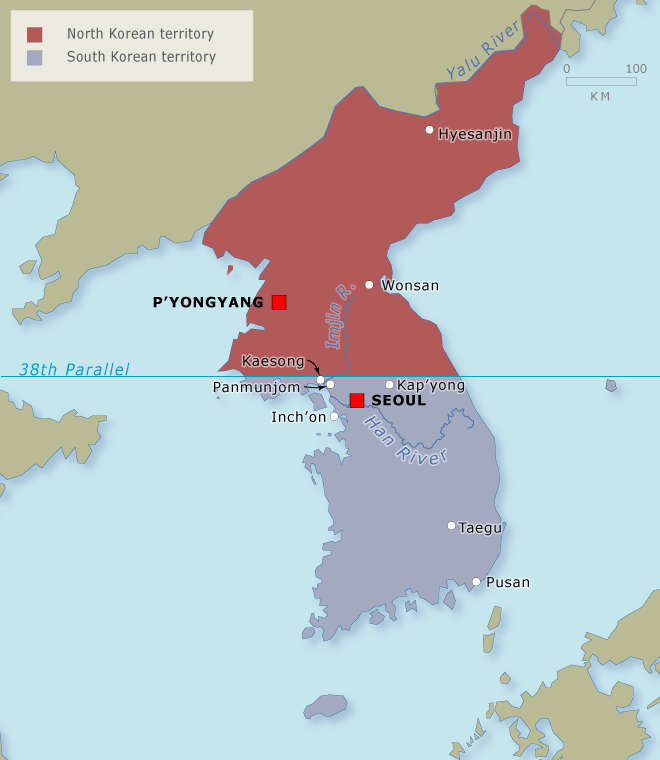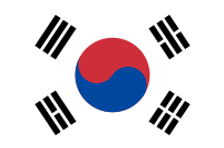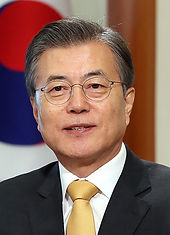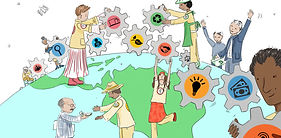WHICH IS THE DIFFERENCE?
GEOPOLITICS
NORTH KOREA vs SOUTH KOREA
NORTH KOREA
Capital: Pyongyang
Government system: "Juche socialist republic"
Language: Korean
Coin: Korean Won
The end of World War II put an end to the Japanese military occupation of Korea by the time the Japanse army surrendered on August 15th, 1945. Subsequently, the Soviet Union proceeded to the occupation of Manchuria, Korea, and the islands of Sakhalin and Kuriles, breaking the non-aggression pact that it had signed with Japan in April 1941.
Consequently, the United States government ordered the occupation of two zones and arbitrarily chose a demarcation along the 38th parallel, which was immediately accepted by the Soviets. Through the next three years, both Koreas negotiated their unification, however, none positive result was achieved.
On September 9th, 1948, the Soviets recognized the Democratic People's Republic of Korea with a government led by Kim Il-sung under a Communist autocratic regime, meaning that he held all the power in his hands.
The war between both Koreas finally broke out when, on June 25th, 1950, the North Korean army crossed the 38th parallel border and arrived at the gates of Seoul, capital of South Korea.
North Korea was led by Kim Il-sung from 1948 until his death in 1994. On October 8, 1997, his son Kim Jong-il was elected by the Supreme People's Assembly as General Secretary of the Party of the Work. After a reform of the Constitution, drawn up in 1972, his position was declared "the highest in the State", as well as "Eternal President of the Republic."
In the late '90s, the country's economy got worse and it suffered from hunger causing thousands of deaths. Around 3 million people died, according to some humanitarian organizations.
Following the death of Kim Jong Il in 2011, his son Kim Jong-un was appointed heir to the Government on September 28th, 2010, assuming the duties of Head of State.
North Korea announced the end of the non-aggression agreement with South Korea, leading to an escalation of tension in 2013. It was due to the military training exercises of its neighbour South Korea together with the United States. In 2016, carried out the underground detonation of the first hydrogen bomb, causing tensions between China, Japan, the United States and South Korea, which quickly qualified it as an international threat. In 2017, North Korea successfully conducted its first test of an intercontinental ballistic missile (ICBM).
SOUTH KOREA
Capital: Seoul
Government system: Unitary presidential
constitutional republic
Language: Korean Pyojun-eo (dialect)
Coin: Korean Republic Won
After the Sino-Japanese Wars and the Russo-Japanese War, Korea came under Japanese colonial rule (1910-1945). At the end of WWII, the Japanese surrendered to Soviet and American forces, which occupied the northern and southern halves of Korea, respectively dividing the country until nowadays.
In June 2000, as part of President Kim Dae-Jung's "Sun Policy", the Inter-Korean Summit was held in Pyongyang, the North Korean capital. This was an attempt at reconciliation on the part of the two Koreas, for which Kim, as a representative of South Korea, received the Nobel Peace Prize years later.
Regarding South Korea, the government is defined as a representative democracy, with a division of powers into executive, judicial and legislative. The head of state is the president elected by direct vote every 5 years, stipulated in the constitution.
South Korea plays an important role in foreign trade relations with the Western part of the world, especially with the European Union, Canada and New Zealand. However, their relations with China have been falling after the division of the peninsula as they decided to approach the United States by moving away from Maoism, a Marxist-Leninist theory adopted by the People's Republic of China since '70s.
Since the end of the Korean War with an armistice in 1953, the tension on the Korean peninsula has never disappeared, due to the succession of various military movements on both sides of the border and in the adjacent seas by the two countries and the rest of regional powers.

North Korean flag

Kim Jong-un, North Korean supreme leader
(2011 - )

38th Parallel dividing both Koreas since 1945

South Korean flag
_cropped.jpg)
Moon Jae-in, President of South Korea (2017- )
MULTIPOLAR vs MULTILATERAL
Multipolar and multilateral words have the same meaning: something with many sides, parts and aspects.
However, the meaning changes when we use the words to describe the world in which we live and the power the subjects of the international community exercise.
In that way, if we say “the world is multipolar”, it means that there are many sides or sources of power exercised by the subjects, both states and non-state actors. (Do we live in a multipolar world?)
When we use this word to describe the international community, we are determining that it is not “bipolar” (two subjects holding the power) and that there is neither a hegemonic power with the leading role in the international community. Instead, many subjects are trying to influence the rest of the participants to achieve their economic or geopolitical goals.
Unlike, in a multilateral way, the subjects or actors try to retain the most amount possible of power and to reduce the number of subjects holding these power. In that way, they avoid to share it and they can retain more because it is less divided and there is less competence.
On the other hand, when we describe the world as “multilateral”, it means that mostly all the subjects of the international sphere work together hand by hand and influence each other to achieve their common and shared goals. Some multilateral organizations are the United Nations or the World Health Organization.
Multilateralism is considered as a necessary way to face the challenges of the world today as climate change and contamination, or a world pandemic situation. Because the issues that emerge nowadays need the action of all the community for the results to manifest or appearing.
In sum, multipolarity reflects the amount of power the subjects can develop, while multilateralism does not refer to the sphere of influence, but collective working among all or most of the subjects.

MULTIPOLAR WORLD

MULTILATERAL WORLD
ISRAELITE vs ISRAELI vs JEWISH vs HEBREW
Israeli designates those people who were born in the modern State of Israel or, in general, those who live in it regardless of their origin, language or religion. Likewise, the term Israeli is the appropriate one to refer to any political institution or organization of that State, as well as to what is related in general to the country.
The terms Hebrew, Jewish and Israelite can be used both to refer to the ancient people of Israel and the religion of Judaism. In practice, however, it is common to reserve Hebrew for the ethnic concept and Jewish for the religious one, a distinction that is recommended to observe. However, even it is not properly, the term Hebrew is frequently used for things related to the State of Israel. According to the Jewish Encyclopedia, the terms Hebrews and Israelites usually describe the same people, stating that they were called Hebrews before the conquest of the Land of Canaan and Israelites afterwards.
Hebrew community is ancient Semitic people of the Mediterranean Levant (Middle East) established in the land known as "Fertile Crescent". They are also ancestors of the Israelites and the Jewish people.
Israelite was the individual that descended from ancient Israel, descendent of Jacob the founder of Israel. Someone Israelite would be part of this ancient community.
Israeli is the term that defines the nationality of all the individuals that are born in the modern State of Israel achieving the citizenry.
Jewish determine the religious condition of the individual, without taking into account any nationality. However, the Jewish Community was born from ancient Israelites in the Middle East, so the religion determines an important aspect in the Jewish ethnic as well as the language, social practices, and rituals.

HEBREW COMMUNITY

Approximate map of the Iron Age KINGDOM OF ISRAEL (blue) and the Kingdom of Judah (yellow). (9th century BC)
